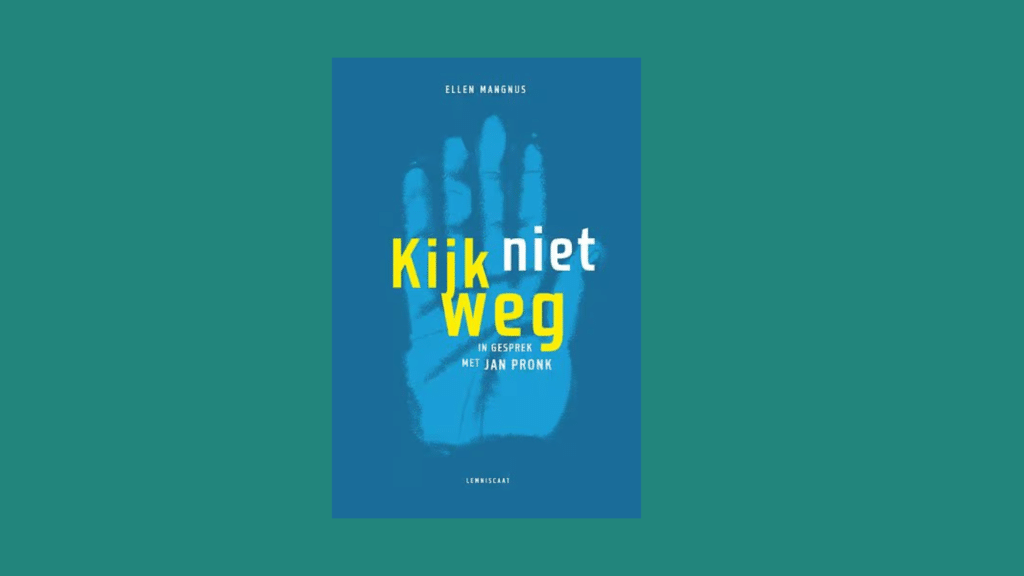In journalist Ellen Mangnus' new book, she talks to Jan Pronk about politics with vision and looking through the eyes of the other. A fascinating book unfolds that is at the same time light-hearted, writes Bram van Leeuwen in this review.
How do you read the title "Don't look away"? As an appeal, command, or warning from a minister, pastor or schoolmaster? At the end of the 235-page retrospective of Jan Pronk's rich career and his vision of future developments inside and outside the Netherlands, I read the well-chosen title as Jan Pronk's non-negotiable command to all his readers. The Netherlands and Europe are not in good shape. The future does not look rosy, but fortunately it is not without hope either, if we are combative to bring about a just world, Pronk said after intensive dialogue with Ellen Mangnus.
After more than 50 years of consistent, thorough and tireless efforts for a better world, you have the right to say, "don't look away". As far as I am concerned, even with a raised finger.
Long struggle against poverty and injustice
The foundation of Pronk's drive was laid in the formative 1950s and 1960s, years in which the inquisitive young "late-breaking Christian" was able to indulge in writings by theologians (including Buskes), sociologists (Breman) and economists (Tinbergen). At the time, he was actively involved in the authoritative institute 'Kerk en Wereld' and, as secretary of the Church and Development Cooperation Working Group, one of the delegates of the Dutch delegation. In Uppsala, he met participants from Africa, Asia and Latin America for the first time. Participants who spoke out loud and clear on themes such as racism, colonial politics and imperialism. His experience as a participant in the illustrious World Conference of the World Council of Churches in Uppsala (1968) may have been decisive for him to dedicate himself in the rest of his life to the fight against poverty and injustice worldwide, literally without limits.
Thanks to the clear questions and concise reflections by Ellen Mangnus, a highly engaging book unfolds in which the reader not only gets a picture of the many responsible roles and functions Pronk has taken on, but above all gets a clear insight into which issues are crucial in our time and how, according to Pronk, these issues are connected. The themes regularly addressed in a clear and reasoned way are poverty, exclusion, climate, violence, insecurity and - and you might not expect this from Pronk - perseverance and patience. Through many practical examples and anecdotes, this incriminating (because you cannot look away) book is at the same time light-hearted.
Looking through the eyes of another
Besides all the appreciation, I would like to make an important observation. The man who has been development minister no less than three times hardly discusses the working methods of this department.
Certainly, Pronk does not hide his exasperation with the actions from the Netherlands. Thus, conscious or unconscious colonial mentality and Western superiority come up a number of times. Among other things, he is annoyed by the Western bias of the Scientific Council for Government Policy (WRR), which in 2010 still defined development as "a deliberate acceleration of modernisation as achieved in the West from the nineteenth century onwards".
The people at stake in international cooperation, environmental justice and poverty reduction, Pronk said, should own development policy as far as their countries are concerned. They should be in the driver's seat should sit rather than in the co-driver's seat. After all, it is still determined - whether or not after rounds of consultation - from donor country the Netherlands with whom, for what, and for how long. In conversation with Mangnus, the new Africa strategy from the cabinet. Although this paper emphasises equality, it still emphasises the need to export Dutch knowledge.
Yet "very un-Pronkian" in this book sticks to critical remarks. This is striking given Pronk's rich international experience, for instance as a member of the international advisory board in the "reversal" of the co-financing organisation ICCO. Why does he not argue that the sector as a whole needs to "turn around"? Or in other words, should start "looking with the eyes of the other" - the title of Chapter 12. Then we will make real work of decolonisation and inclusion. Pronk does not outline how that "looking with the eyes of the other" can take shape in the development sector.
Double standards
Yet Pronk certainly does not avoid difficult issues. In the penultimate chapter ("Seeing blind"), he reflects on the war in Gaza. He emphatically points to "double standards" as the cause of the loss of credibility of the Netherlands and the Western world. We struggle to understand why countries from the Southern Hemisphere do not automatically support our positions on contemporary wars in Ukraine and Israel. This failure to understand stems from our poor ability to "see with the eyes of the other". In a very poignant and painful way, for example, Pankaj Mishra illustrates this rightness of Jan in his essay In De Groene Amsterdammer.
Exquisite and thought-provoking is Pronk's afterword. Courageously he acknowledges his disappointment and gloom about the state of the world, but at the same time he dares to energetically set out a vision for an agenda for the future. "Ten about Green" gives ten handles for politicians and citizens. We can get to work with these. Don't look away and look with the eyes of the other, then we will have politicians with enough guts to tackle the big issues successfully. That conviction, I read this book, is the basis of the belief that a just world can be created.
Jan, I am convinced that Willy Brand, whom you admired, would surely say about you, "Jan Pronk hat sich bemueht" and would have added, in life and times, "... und bemueht sich immer noch....bitte, mach das weiterhin"!





